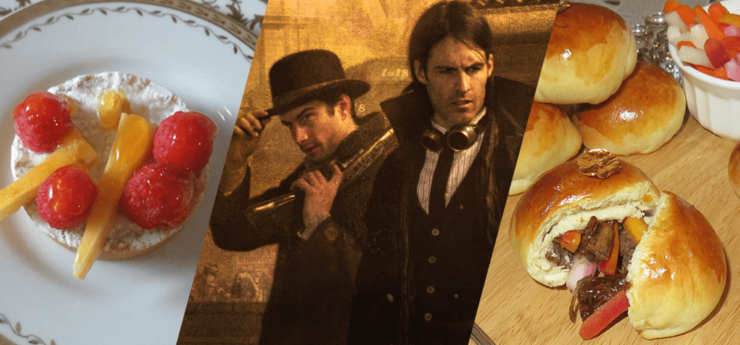Welcome Sanderson Fans, Cosmerenauts, and foodies to Tor.com’s newest adventures through the culinary Cosmere! Here we ask the important questions about what the people on the worlds of Brandon Sanderson eat along with their ingested metals and investiture.
Join Deana Whitney, a Sanderson Beta-reader and foodie, as she continues to explore the different cuisines in the Cosmere food chains. In this installment, we’ll take a delicious journey through Scadrial during Era 2.
It has been 300-plus years since Scadrial was a world of ash and brown plants, where foods were pickled, preserved, and not very nutritious—check out our discussion of Era 1 in the first Cosmere Cuisine article.
Harmony blessed the people of the basin with a new geography and plant life. Let’s speculate on what has changed over the 300 years since the Catacendre: How has access to more food types altered the population’s taste in food? What has remained the same in their diet, and what has changed for the people of the basin and roughs? In terms of the people of the North, we know nothing beyond the fact that they have better chocolate. How that happened in a frozen land is unclear; we will have to credit Investiture magic for the oddity.
Harmony gentled the world in multiple ways. The plants are green again, and the sky is blue. The world of ash is gone. The foods of Scadrial are now essentially the foods of Earth, full of colors—well, the foods found in temperate zones, at least. Wayne has yet to make a coconut joke, so for now access to tropical foods are unknown. In addition to creating a physical paradise, Harmony gentled the process of snapping. More people know that they are metalborn in Era 2 without being tortured, though an element of trauma remains to snapping.
Elendel is the focus of the new world. It is a very different city than Luthadel. Centuries ago the Lord Mistborn established a law that all ornamental trees must produce food. Thus, I envision streets lined with fruit-bearing apple and cherry trees (unlike the cherry blossom trees found in Washington, D.C.). To support all these trees there must be a large number of gardeners (and squirrels) in Elendel. Food trees are messy! Whether they produce nuts or fruits, syrups, or useful bark, they always require attention. On the plus side, the base ingredient for a fruit cobbler might be no further than your front yard, or just a street away. I believe the city population has a preference for a wide range of fruit dishes across all income levels.
Buy the Book


Mistborn: The Wax and Wayne Series
Access to more types of foods does not erase centuries of conditioning and tastes in a culture—it expands them. The philosophy of the Survivor would blend naturally into the belief that you use as much of the animal and plant as possible for food. As in Era 1, expect to find tripe, blood sausage, and pickled pigs’ feet in Scadrial markets. I think haggis would still be a common food item. The Scottish haven’t given it up in 300 years—I don’t think the Scadrians will either.
In Era 2 the expanded food flavors will include rich varieties of seafood from the ocean. (Though I do wonder if the lobsters on Scadrial were considered a “trash meal” at any time.) The Roughs don’t have access to fresh seafood, but fish are present in the rivers to a degree not seen in Era 1. They would have a supply of dried and salted ocean fish thanks to trade from the railways. The baywraps of Era 1 could now have evolved into a fish taco served with barley and a coleslaw on a spinach tortilla: easy street food for busy people.
There is still a divide between the foods of the common skaa and the delicacies the nobles enjoy. Sadly, being surrounded by green plants does not change economic forces. It is clear that a number of foods are more accessible, though. The soups from Era 1 would expand to incorporate the new flavors, but would not necessarily remain the primary source of nutrition to the skaa population.
In Era 2, Wayne is the best source of information we have about the foods available. He seems to have an affinity for walnuts. (Since those induce a severe allergic reaction in my family, I don’t cook with them.) From him we learn about the wild carrots growing in the basin, leading me to theorize that most root vegetables can be easily found, but carrots are not predominantly orange on Scadrial.
Dining with the Skaa
Scones & Meat Buns
Sanderson does not provide very many tasty details when he mentions food on Scadrial. For Era 2, our recipes will focus on the foods specifically mentioned in the story, based on my speculation about their compositions. Trace metal in the groundwater is not important, unlike in Era 1. Metals are used openly by allomancers while drinking. Even skaa metalborn are free to dust their food with metals openly. There is no fear of Steel Inquisitors showing up to arrest them, or worse.
In The Alloy of Law, Wayne visits a police station. He walks away with information and scones. Thanks to the offer of mustard to Marasi, we know savory scones are one choice. With all the fruit around, there have to be sweet options, too. The best scones use heavy cream; it gives a better texture to the dough and a richer taste. Both types are buttery, with a crunchy exterior and a fluffy chewy interior, yet highlight the flavors mixed into the dough.
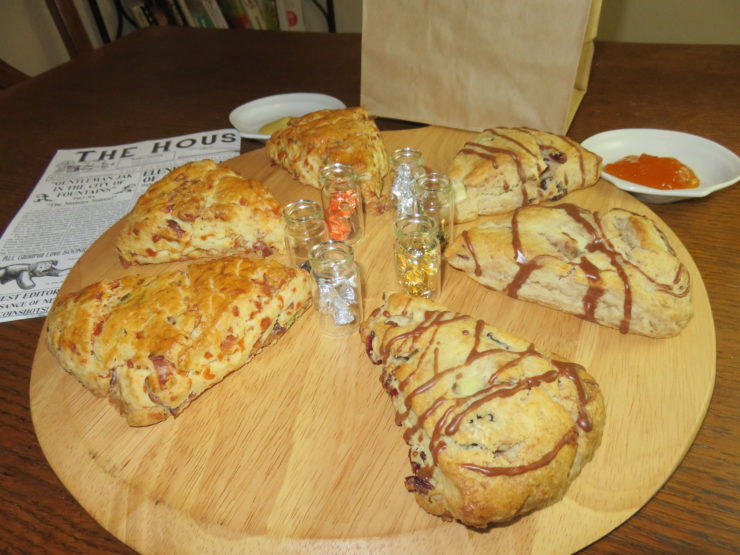
Scones: Savory — Bacon & Cheddar
Ingredients
- 2 cups all-purpose flour
- 1 tablespoon baking powder
- 2 teaspoons sugar
- 4 tablespoons butter (if unsalted, add ½ teaspoon salt; if using salted butter, no need for extra salt)
- 1 cup coarsely grated cheddar cheese
- Up to ⅓ cup fresh chives – to your taste
- ½ pound (about 1 cup) of pre-cooked and cooled bacon.
- 1 cup heavy cream—not all added at once.
Directions
- Cook 2 pounds of bacon of choice to a crispy texture. Let cool, then chop coarsely until you have 1 cup of bacon pieces. Set aside.
- Mix the flour, baking powder, sugar, and salt (if necessary) in a bowl.
- Work room temperature butter in the mix with a fork or crumbling together with your hands. Mixture is crumbly and uneven in texture.
- Mix in the cheddar cheese, bacon, and chives until evenly distributed.
- Add ¾ cup of the heavy cream, stirring to combine the dough.
- Try to squeeze the dough together with your hands. If it will not stick together, add more heavy cream, half a tablespoon at a time.
- When dough is together in a rough ball, move the dough to a well-floured work surface.
- Shape dough into a disk about 7” across and ¾” thick. Cut like a pizza into 8 wedges.
- Transfer wedges to parchment paper, lightly cover with cling wrap, and cool in the fridge for 20 minutes.
- Preheat oven to 425 degrees Fahrenheit, with the oven rack in the middle of the oven.
- Move wedges onto a baking sheet on their parchment paper. Brush the tops with extra heavy cream like an egg wash.
- Cook for 18 to 20 minutes until golden brown.
- Top with extra items as you wish. Wayne seems to like mustard. Choose the metal flakes that match your ability.
Scones: Sweet — Apple & Cranberry, with cinnamon glaze
Ingredients
- 2 cups all-purpose flour
- 1 tablespoon baking powder
- 4 tablespoons sugar
- 2 teaspoons of cinnamon
- 5 tablespoons cold butter (if unsalted, add ½ teaspoon salt; if using salted butter, no need for extra salt)
- ⅓ cup dried cranberries
- 1 cup Apples, cubed – up to you if you leave the peel on. Use a good cooking apple.
- 1 cup heavy cream—not all added at once.
Directions
- Place the dried cranberries into ¾ cup of the heavy cream. Leave alone for 5-10 minutes. This helps rehydrate them and adds more flavor.
- Peel (if necessary) and cut your apples into small cubes. Set aside.
- Follow steps 2 & 3 of Bacon & Cheddar scones.
- Add apples to the dough. Mix well.
- Add the cranberries and ¾ cup of heavy cream to the dough, mix well to distribute evenly.
- Follow steps 6 through 11 of the Bacon & Cheddar scones. Let cool for 2 minutes. Then add the glaze on top.
Cinnamon Glaze
- 1/2 cup powdered sugar
- 1 1/2 teaspoons ground cinnamon
- 1 1/2 tablespoons milk or heavy cream
Directions—make while scones are cooking
- Mix the powdered sugar and cinnamon together in a small bowl.
- Add 1 Tablespoon of milk (heavy cream) to mix and stir. Look for a thin syrup consistency. If too thick, add extra milk one teaspoon at a time. If too thin, add extra powdered sugar one teaspoon at a time. Should be able to cling to the spoon, but still flow.
- Drizzle over the slightly cooled scones in ribbons.
Meat Buns: Beef Bao
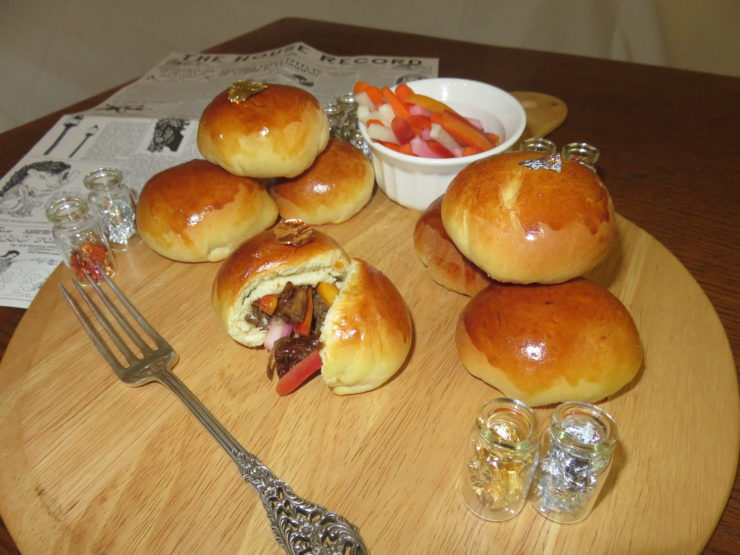
During Wayne’s quest, he obtained meat buns for a silver fork. Being in Texas, my first thought was a klobasniky-type bun, however that only seems to have developed in Texas. Bao-type buns, however, have developed in many cultures; buns either steamed or baked, with soft chewy interiors. Since Wayne and the children throw them around, the baked yeast buns are a sturdier option than the softer steamed versions. (Note: after making these, I think the baker sold her buns too cheaply. Or else silver is really valuable, despite its lack of allomantic powers.)
The buns have the fluffy texture of a good dinner roll with the yeasty flavor that holds its own with the meat and sauce. The slow cooking makes the beef fork-tender and falling apart, while holding in rich flavors enhanced by a bold balsamic sauce. Contrasting this texture are the pickled vegetables included in the buns. They provide a crunch and a tang to break up the richness of the sauced meat. I chose to go with beef because it has been mentioned more than pork on Scadrial.
Order of operations:
- Pickle the vegetables the day before.
- Cook the beef nine hours before the meal.
- Start the dough 2 hours before the beef is finished.
- Cook the glaze 30 minutes before the meat is done.
Pickled Radishes & Carrots
Ingredients
- 2 cups Daikon radish
- 2 cups carrots (I recommend using white, purple, and yellow ones)
- 1 cup water
- 1 cup rice vinegar
- 1 cup white sugar
- ½ teaspoon salt
Directions
- Wash and peel your vegetables, then julienne them. For inclusion in a bao, cut 1-inch strips rather than the typical 2-inch length of a julienne cut. Place vegetables in a pickling jar or airtight glass container and set aside to prep the pickling liquid.
- Add all liquid ingredients to a medium saucepan on medium heat. Add the sugar and salt, stirring until the sugar dissolves. Let boil for 3 to 4 minutes, stirring occasionally. Remove from heat and let cool to lukewarm.
- Pour the lukewarm pickling liquid over the vegetables. Ensure that they are totally covered by the liquid. Any purple carrots will turn the water pinkish.
- Store in an airtight container, set aside to cool and pickle for at least 2 hours. Can be kept for up to a week.
Beef with Honey Balsamic Glaze
Ingredients
- 3 to 4 pound boneless beef chuck roast, containing a good marbling of fat
- 1 ½ cups beef broth
- 1 cup water
- 2 tablespoons Worcestershire sauce
- 3 teaspoons dried thyme leaves, crushed
- 2 teaspoons salt
- 3 teaspoons freshly ground black pepper
- 6 cloves garlic, minced
Directions
- Pierce the roast all over with a small, sharp knife.
- Place the roast in a large slow cooker.
- Stir the Worcestershire sauce into ½ cup of broth and pour over the top of the roast.
- In a small bowl combine the thyme, salt, and pepper; evenly sprinkle over the roast and rub in. Scatter the minced garlic over the top of the roast and press into the surface on both sides.
- Pour in remaining cup of broth and at least 1 cup of water until the beef is submerged in the slow cooker.
- Cook on low for 8 to 10 hours, until the roast is tender.
- Check it occasionally, and rotate the meat.
- Once the roast is done, remove it to a cutting board. Drain the liquids from the slow cooker and wipe out any remaining fat with paper towels.
- Shred the beef and discard remaining fat chunks. Return the shredded beef to the slow cooker, stir in your desired amount of sauce to coat the meat.
- Can be kept warm until stuffed in a bun, or enjoyed on its own.
Honey Balsamic Glaze
- 1/2 cup honey
- 1/2 cup balsamic vinegar
- 1 cup water
- 1/4 cup soy sauce
- 2 tablespoons cornstarch
Directions
A half hour before the beef is done, prepare the glaze.
- In a medium pot, whisk together the honey, balsamic, water, soy sauce, and cornstarch until the cornstarch has dissolved.
- Bring to a low simmer, stirring occasionally for a few minutes or until the mixture has thickened (it will continue to thicken as it cools). Remove from the heat and set aside.
- Can be reheated on the stove or in the microwave. Keep extra in an airtight container.
Bao Dough
Ingredients
- 2 1/4 teaspoons (1 package) of dried yeast
- 1/4 cup sugar
- 1/2 cup warm water
- 2 cups plain flour
- 2 eggs, slightly beaten
- 3 tablespoons oil
- ½ teaspoon salt
- Egg wash: 1 egg beaten with a dash of water
Directions (makes enough for 12 buns)
- Mix sugar and warm water in a bowl, stir until sugar is dissolved.
- Add yeast to mixture and leave alone for 10-15 minutes, while the yeast is activated. The mixture will become frothy.
- Sift the flour into a large bowl.
- Add one egg, oil, salt, and yeast mixture to the flour. Mix it together with your hands until all are combined into one ball.
- Place dough on a lightly floured surface and knead for about 10 minutes. The better the kneading, the better your final bread texture. The dough should be smooth and slightly elastic when you are finished.
- Place in a lightly oiled bowl and cover with a damp cloth. Leave it alone to rise for 1-2 hours, until it doubles. Local weather conditions will affect the timing of this.
- Once the dough has doubled, punch it down to break up the large air pockets. Fold it back upon itself a few more times to remove other larger air pockets.
- Divide dough into 12 portions and shape into round balls.
- Now assemble the beef buns.
Assemble the Beef buns (Note, you will have leftover meat, enjoy it on its own! Or make more than one batch of dough.)
- Roll a dough ball flat into a 2-inch circle. Pick it up, then pinch out the edges to thin those out until the dough is a 3-inch circle in diameter.
- Place a tablespoon of glazed meat in the center.
- Place 3-4 pickled vegetables sticks on top of the meat.
- Add extra glaze (optional); it will be absorbed by the buns as they cook.
- Gather the ends of the dough together and pinch closed.
- Place the pinched end down on the sheet pan.
- Cover in an egg wash once you have a sheet full of buns.
- Cook at 400 degrees Fahrenheit for 15 minutes or until golden brown.
Dining with the Nobles
Bisque and Tarts
Waxillium doesn’t spend much time thinking about his food in Era 2. Wayne provides the most information, be he acting like a waiter or a chef. A wedding dinner sounds better to me than a breakfast. They’re probably more like brunches by the time the wedding is actually over—when not interrupted by bandits or falling water towers.
This soup is inspired by the Yomen family’s bisque, which they like to serve at formal events. The inclusion of mushrooms provides the soup with more body and extra texture. The spiced stock holds its flavor well, simply being enhanced by the heavy cream. To make your shrimp go farther, you can cut it up in small chunks, but the presentation of whole shrimp is hard to beat. In addition to the soup and tart below, serve a mixed green salad with roasted beets and goat cheese. Bon Appetit!
Shrimp and Mushroom Bisque
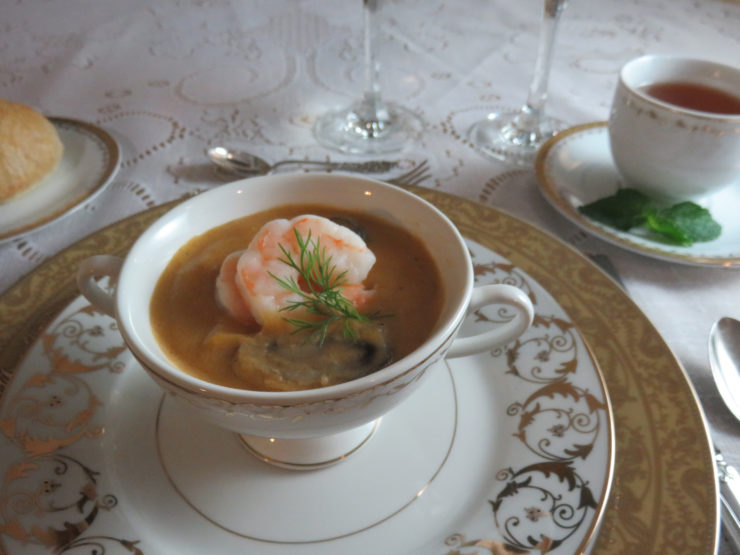
Ingredients
- 6 tablespoons salted butter
- 4 tablespoons grated carrots (one medium carrot)
- 1 celery stalk, finely chopped
- 1 shallot, finely chopped
- 6 cloves garlic, minced
- ½ pound mushrooms, sliced
- ¼ cup white wine (optional)
- 2 cups chicken broth (Use shrimp or seafood stock if you prefer)
- 2 teaspoons salt (1 for the broth, 1 for the mushrooms)
- 2 teaspoons freshly ground pepper, mixed types
- 1 teaspoon paprika (optional, gives a better color)
- ½ teaspoon thyme
- 2 teaspoons of your favorite hot sauce
- 1 pound shrimp
- 2 cups heavy cream
Directions (Makes about 6 cups)
- Clean the shrimp, set aside.
- Melt 4 tablespoons of butter in a large pot over medium heat.
- Add the carrots and celery. Sauté for 5 minutes.
- Add the shallot and 4 cloves of garlic to the pan. Sauté for 3 minutes, take care not to burn the garlic.
- Add the white wine to deglaze the pan. Cook for 30 seconds to evaporate the alcohol. If not using wine, use extra broth.
- Add the broth, spices, and hot sauce. Let simmer.
- While soup is simmering, cook the mushrooms in a separate pan. On medium heat, melt 2 tablespoons of butter. Then add the remaining 2 tablespoons of garlic, 1 teaspoon of salt, and the ½ pounds of mushrooms. Cook until tender.
- Use a hand-held immersion blender to puree the soup until it is completely smooth.
- Add the mushrooms to the bisque. Turn up the heat, bring everything to a boil for a minute, then reduce the heat to low and simmer.
- Add the shrimp to the soup. If they are pre-cooked, just heat until warm. If shrimp are raw, simmer for 3 to 4 minutes until cooked and pink.
- Stir in heavy cream and simmer 4 minutes until just thickened. Do not boil the soup.
- Serve immediately. OR,
- If you refrigerate the bisque overnight, the flavors will develop more. Only cook the shrimp for about 2 minutes, in this case. Reheat by bringing it to a simmer on the stove before serving. Stir often. Do not use the microwave to reheat.
Wedding Tarts
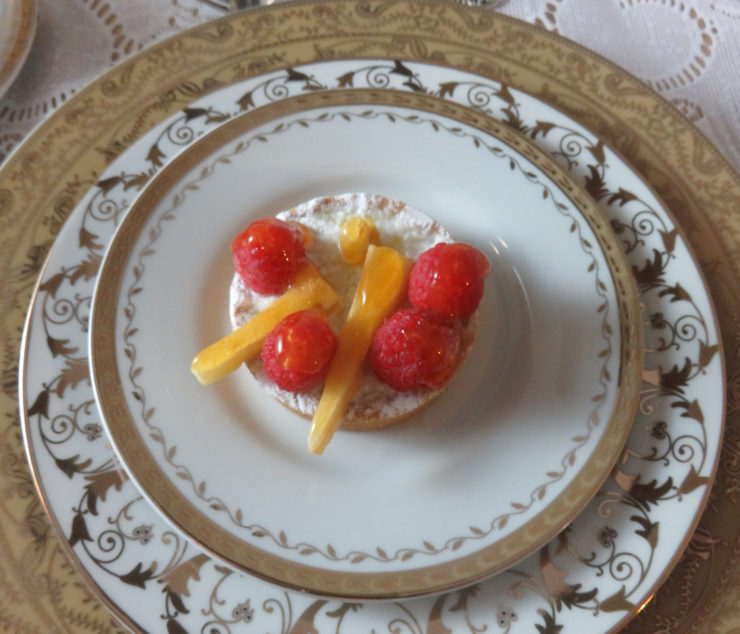
At the Harms-Ladrian wedding, fruit tarts were on the menu. The lemon tart shown is decorated with the letter “L”, represented by the zinc symbol in the Scadrial alphabet. The shell is crumbly, and not too sweet. It provides the housing for a bright, tangy lemon curd that is smooth on the tongue. The fruit toppings provide a contrast of texture, with an extra note of sweetness. The glaze is more for visual appeal; the apricot flavor is too mild to stand out over the raspberry and apple.
Tart Shell
- 1 1/3 cups all-purpose flour
- ½ cup cold unsalted butter, cubed
- 1/4 cup granulated sugar
- ⅛ teaspoon salt – a pinch
- 2 egg yolks
Directions
- Cut the butter into the flour until the mixture resembles coarse breadcrumbs.
- Stir in the sugar and salt, then add the egg yolks until just combined. Use your hands to work the mixture into a dough. It will seem too dry at first, but as you mix it will start to come together.
- Roll the dough out on a floured surface until about ¼ inch thick.
- Cut the pastry into rounds with a cookie cutter and press into muffin tins or tart tins of your choice.
- Freeze for 30 minutes.
- Bake at 350° F for 20 minutes or until golden. Set aside to cool.
Lemon curd (makes about 1 1/2 cups in total)
- 1/3 cup lemon juice, about 2 lemons
- 2 large eggs
- 1 egg yolk
- 1/2 cup sugar
- 2 tablespoon chilled unsalted butter cut into 1/2-inch cubes
- 1 tablespoon heavy cream
- 1/4 teaspoon vanilla extract
- ⅛ teaspoon salt – a pinch
Directions
- Heat lemon juice over medium heat until hot but not boiling.
- Meanwhile, whisk eggs and yolk in a medium bowl. Gradually whisk in the sugar. While whisking, slowly pour hot lemon juice into the eggs. Return to saucepan and cook over medium heat. Stir constantly with a wooden or Teflon spoon until mixture reaches 170 degrees Fahrenheit and coats the back of the spoon. The mixture will bubble and thicken almost instantly when it reaches the right temperature.
- Remove pan from heat and stir in butter. Once melted, stir in cream, vanilla, and salt. If the curd didn’t come together and thicken, return to heat and cook a bit longer, stirring constantly, until it thickens.
- Curd can be stored in an airtight container in the fridge for up to a week, just cover with plastic wrap to prevent it from drying out.
Fruit glaze
- 1 cup apricot jam
- 1 tablespoon water
- Fruit of choice to glaze and decorate. Shown are apple slices and raspberries.
Directions
- Heat apricot jam and water in a saucepan over medium heat until liquid. Stir well.
- Using a fine strainer, strain the mixture into a bowl. This removes any fruit lumps.
- Glaze the fruit when warm and liquid still runs. Can be kept on the stove on low if you are glazing a large amount of fruit. May be stored in an airtight container and reheated later.
Assemble the lemon tarts:
- Spoon the lemon curd into each tartlet shell.
- Let firm up—on the table or can be can be placed in the refrigerator.
- Top each tartlet with a glazed fruit, dust with powdered sugar or metals (optional) and serve.
On that sweet note, we end another Cosmere meal on Scadrial. What scone flavors would you create? What flavors would you stuff inside a bao?
Photos: Deana Whitney, 2019
Deana Whitney is a foodie, researcher, and Sanderson beta reader. One area of Scadrial food she would love to know more about is the Terris food Marasi mentions. Despite efforts in asking Dragonsteel, she has not been able to learn more about Terris food. She believes, as traditional herdsmen, goat meat and goat milk products would be used to a greater degree there than in the skaa cuisine.










